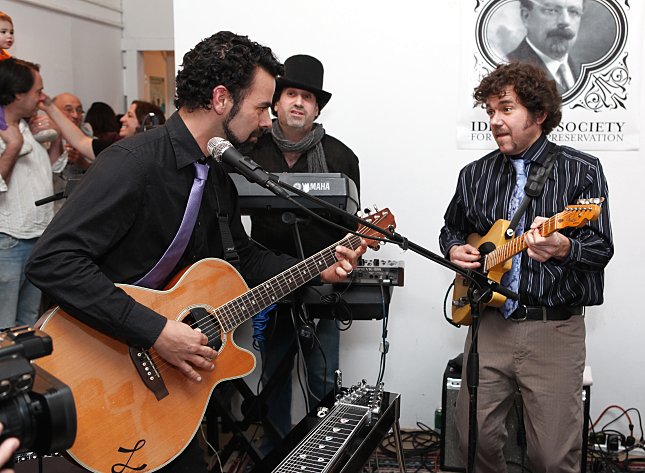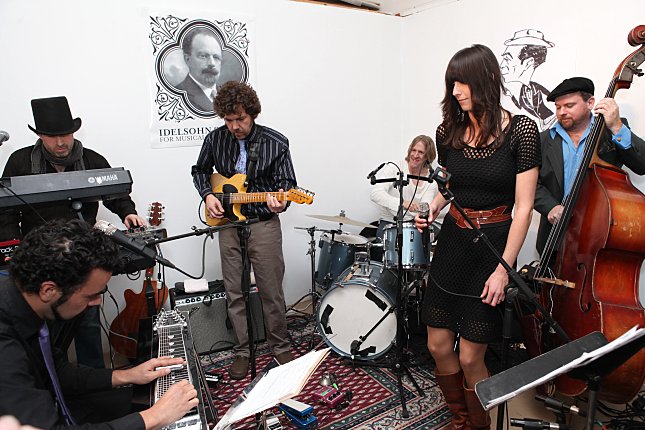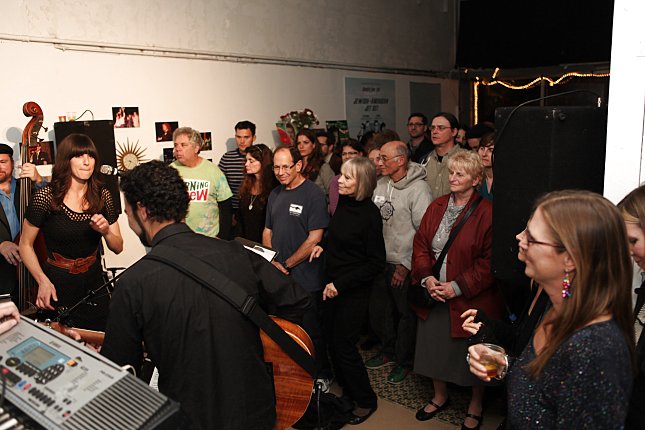Dan Lebowitz: And on the Second Night …
-
Tonight is musician Dan Lebowitz’s second night at the Tikva Records store in San Francisco. And it’s his second night in two ways. It’s his second performance on the Tikva stage — which is to say, the back of the main room — and it’s the second night of Hanukkah.
This past Saturday night, he led a crack band through two sets of tributes to the famed Jewish writers who made the Brill Building synonymous with great songs (“Love Potion No. 9,” “You’ve Lost That Lovin’ Feelin’”), and tonight he’s playing a Hanukkah show. (The photos on this page, by Susan J Weiand, of susanjweiand.com/rockpics, are from Saturday night.)
That’s Dan Lebowitz on the left, leading the band. Lebowitz, who is best known as a member of the Brushfire Records band ALO (Animal Liberation Orchestra), spoke with us, after a rehearsal, about how adaptable the Brill songbook is, about growing up Jewish in the South Bay area, and about the centrality of holidays to his upbringing.
Tikva Records: First, to borrow a question from another Jewish holiday: How is tonight different from the Brill Building night?
Dan Lebowitz: Tonight is different, definitely. With the Brill Building night, we had a concept: the music of the Brill Building songwriters. Specifically what I wanted to get across was this idea that we were paying tribute to the songs, not the performances, which is really paying tribute to those Jewish songwriters. We interpreted them, we jammed them out, and we tried different feels.
Tikva: Yeah, country versions, reggae versions.
Lebowitz: Yeah, country, all this stuff. It was to say, “Hey, you can play this song any way you want.” Get some musicians together with a good song, and there you go. That was a real concept, and it guided everything. Tonight is a Hanukkah show, a band of musicians I play with, and we’re mixing it up. We’ll play originals and some covers and holidays songs, and a lot that aren’t holiday songs. It’s fun — a celebration.
Tikva: The question we have asked just about everyone, in the course of this Tikva Records blog coverage, is this idea of assimilation, about the extent to which their faith is remote from, or part of, what they do.
Lebowitz: It is in that culturally I definitely grew up Jewish and feel very Jewish, but I wouldn’t say it’s a big guiding force in my music.
Tikva: Wil-Dog, of Ozomatli, said something about how his memories of Jewishness as a young child made the term synonymous with “hiding.”
Lebowitz: You know, that’s an interesting take. I grew up in the South Bay, the Bay Area — one of the things that’s unique about Judaism is there’s this cultural component and this religious component. I would say most people I know are cultural Jews, not religious Jews. I am pretty open-minded when it comes to religions. I am not subscribing too hard to anything specifically, except my belief in goodness. [Laughs] But I feel Jewish because of my culture, the story of my great great grandparents coming over on the boat, down to my grandparents, down to my parents. The holidays were celebrated in my house, and we always identified as Jewish. The hiding thing is interesting. I can relate. I didn’t have a lot of Jewish friends growing up. We went to synagogue for Hebrew school, but in my actual school there were just a few Jews, but none of them did music, and most of my friends were through music. I didn’t hang out with that many Jewish kids. It wasn’t a big thing outside of family, but in my family it was a deep deep current
Keep an eye on the Tikva Records calendar for all the events happening throughout the month of December.





